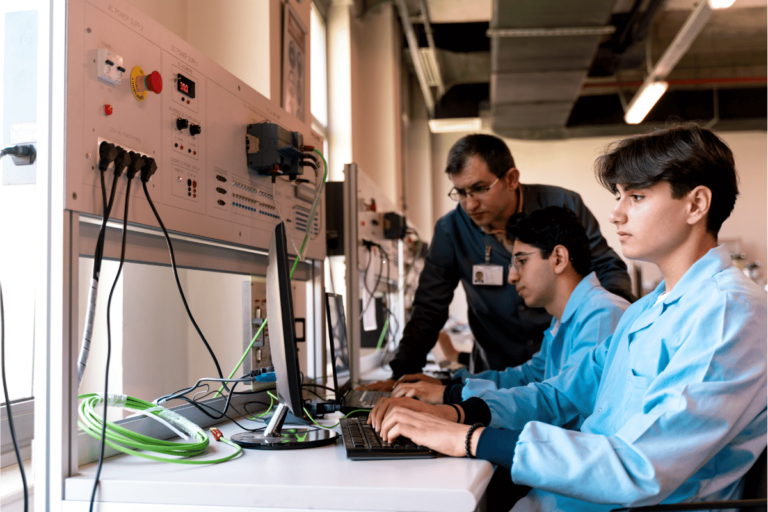Are you curious about the game-changing impact of the SOLAS strategy for vocational training in Ireland?
Brace yourself, as we delve into the remarkable transformations brought about by this innovative approach.
By enhancing access, improving quality, and meeting the needs of learners and employers, SOLAS has revolutionized the vocational education landscape.
Join us in this analysis as we examine the successes, challenges, and areas for improvement of this groundbreaking strategy.
Key Takeaways
- The SOLAS Strategy was implemented in 2013 to streamline vocational training in Ireland by consolidating multiple agencies and bodies under a single authority.
- The strategy has focused on enhancing access to vocational training through financial support, partnerships with community organizations and educational institutions, and the development of online platforms for distance learning.
- It has also aimed to improve the quality and relevance of vocational education by conducting research, working with industry experts, and promoting work-based learning opportunities.
- The SOLAS Strategy has met the needs of learners and employers by providing learner support initiatives, engaging with employers, and offering practical experience opportunities.
The Evolution of the SOLAS Strategy
You should examine the progression of the SOLAS Strategy to understand its development and effectiveness. The evolution of the SOLAS Strategy can be traced back to its implementation in 2013. This strategy was introduced by the Irish government as a response to the need for a more streamlined and coordinated approach to vocational training in the country. The aim was to consolidate the functions of multiple agencies and bodies involved in vocational education and training under a single authority, namely SOLAS.
The implementation of the SOLAS Strategy involved a significant restructuring of the vocational training landscape in Ireland. It led to the dissolution of FÁS, the national training and employment agency, and the transfer of its responsibilities to SOLAS. This restructuring was aimed at improving the quality and effectiveness of vocational training programs, as well as enhancing the coordination between training providers and employers.
Since its implementation, the SOLAS Strategy has undergone several changes and adaptations to better align with the evolving needs of the labor market and the vocational training sector. These changes have included the development of new training programs, the establishment of sector-specific training networks, and the introduction of apprenticeship schemes in emerging industries.
Enhancing Access to Vocational Training
To ensure a more inclusive and accessible vocational training system, SOLAS has implemented various initiatives and programs. These efforts aim to increase participation and promote inclusivity among individuals seeking vocational training in Ireland. By focusing on enhancing access to vocational training, SOLAS is addressing the barriers that may hinder certain groups from accessing these opportunities.
One of the key initiatives implemented by SOLAS is the provision of financial support for individuals who may face financial constraints in pursuing vocational training. Through funding schemes and grants, SOLAS aims to remove the financial barriers that may prevent individuals from enrolling in vocational training programs.
Additionally, SOLAS has established partnerships with community organizations and educational institutions to expand the reach of vocational training programs. By collaborating with these organizations, SOLAS is able to bring vocational training opportunities closer to communities and individuals who may have limited access to traditional training centers.
Furthermore, SOLAS has developed online platforms and resources to facilitate distance learning and provide flexibility for individuals who may have other commitments or geographical limitations. These online platforms allow individuals to access vocational training courses and resources at their own convenience, thus promoting inclusivity and increasing participation.
Overall, SOLAS’s initiatives and programs aimed at enhancing access to vocational training are crucial in promoting inclusivity and increasing participation among individuals in Ireland. By addressing barriers such as financial constraints and limited access to training centers, SOLAS is ensuring that vocational training opportunities are accessible to all who seek them.
| Initiative/Program | Description |
|---|---|
| Financial support | Provision of funding schemes and grants to individuals facing financial constraints |
| Partnerships with community organizations and educational institutions | Collaboration to expand reach of vocational training programs |
| Online platforms and resources | Facilitating distance learning and providing flexibility for individuals with other commitments or geographical limitations |
Improving Quality and Relevance of Vocational Education
By focusing on enhancing the quality and relevance of vocational education, SOLAS aims to ensure that individuals receive training that aligns with industry demands and equips them with the necessary skills for successful careers. To achieve this, SOLAS has implemented various strategies and initiatives that address the skills gap and foster industry partnerships.
-
Identification of Skills Gap: SOLAS conducts regular research and analysis to identify the skills gap in different industries. This helps in designing vocational training programs that are aligned with the current and future needs of the labor market.
-
Curriculum Development: SOLAS works closely with industry experts and employers to develop curriculum that’s relevant and up-to-date. This ensures that vocational education programs impart the skills and knowledge that are in demand in the industry.
-
Industry Partnerships: SOLAS actively seeks partnerships with industries and employers to establish strong connections between vocational education providers and the industry. These partnerships facilitate the exchange of knowledge, resources, and expertise, resulting in vocational training that’s directly linked to industry requirements.
-
Work-Based Learning: SOLAS promotes work-based learning opportunities such as apprenticeships, internships, and on-the-job training. These experiences provide students with practical skills and real-world experience, making them more employable and ready to contribute to the industry upon graduation.
Meeting the Needs of Learners and Employers
Ensuring the relevance and effectiveness of vocational training, SOLAS actively collaborates with learners and employers, addressing their specific needs and providing tailored programs and support.
One way SOLAS meets the needs of learners is through learner support initiatives. These initiatives aim to provide guidance and assistance to learners throughout their vocational training journey. By offering resources such as career counseling, study skills workshops, and access to support networks, SOLAS helps learners navigate any challenges they may encounter and ensures their success in the program.
In addition to learner support, SOLAS also recognizes the importance of industry partnerships in meeting the needs of both learners and employers. By actively engaging with employers, SOLAS can gain insights into the skills and competencies that are in demand in the job market. This information informs the development of vocational training programs that align with industry needs, ensuring that learners are equipped with the relevant skills and knowledge to succeed in their chosen career paths.
Furthermore, industry partnerships also provide opportunities for learners to gain practical experience through internships, apprenticeships, or work placements, enhancing their employability and bridging the gap between education and the workforce.
Challenges and Areas for Improvement in the SOLAS Strategy
One challenge that you may encounter in the SOLAS strategy is the need for greater funding and resources to support the expansion and improvement of vocational training programs. Although the SOLAS strategy has made significant progress in meeting the needs of learners and employers, there are still areas for improvement.
Here are some challenges and areas for improvement in the SOLAS strategy:
-
Developing partnerships: One challenge is the need to develop stronger partnerships between SOLAS and industry stakeholders. By collaborating with employers, trade unions, and professional bodies, SOLAS can ensure that vocational training programs are aligned with industry needs and provide learners with the skills necessary for employment.
-
Funding constraints: Another challenge is the limited funding available for vocational training programs. Greater investment is needed to enhance the quality of training, update equipment and facilities, and provide ongoing support for learners. This could be achieved through increased government funding or through partnerships with private sector organizations.
-
Addressing regional disparities: The SOLAS strategy should also focus on addressing regional disparities in access to vocational training. Efforts should be made to ensure that training opportunities are available and accessible to learners in all parts of Ireland, regardless of their geographic location.
-
Enhancing career guidance services: Finally, the SOLAS strategy could benefit from improving career guidance services for learners. By providing comprehensive and personalized guidance, learners can make informed decisions about their career paths and choose the most suitable vocational training programs.
Conclusion
In conclusion, the SOLAS strategy for vocational training in Ireland has made significant strides in enhancing access, improving quality and relevance, and meeting the needs of learners and employers.
However, challenges still remain, and areas for improvement must be addressed.
As the strategy continues to evolve, it’s crucial to focus on overcoming these challenges and ensuring that vocational education in Ireland remains effective and impactful.
Like a compass guiding the way, SOLAS will continue to lead the path towards a stronger and more successful vocational training system.


